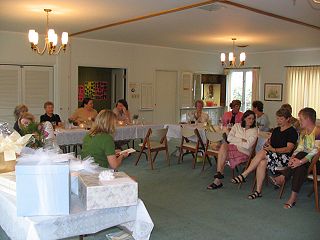Related Research Articles

A wedding is a ceremony in which two people are united in marriage. Wedding traditions and customs vary greatly between cultures, ethnicities, races, religions, denominations, countries, social classes, and sexual orientations. Most wedding ceremonies involve an exchange of marriage vows by a couple; a presentation of a gift ; and a public proclamation of marriage by an authority figure or celebrant. Special wedding garments are often worn, and the ceremony is sometimes followed by a wedding reception. Music, poetry, prayers, or readings from religious texts or literature are also commonly incorporated into the ceremony, as well as superstitious customs.

A wedding reception is a party usually held after the completion of a marriage ceremony as hospitality for those who have attended the wedding, hence the name reception: the couple receive society, in the form of family and friends, for the first time as a married couple. Hosts provide their choice of food and drink, although a wedding cake is popular.

A gift or present is an item given to someone without the expectation of payment or anything in return. Although gift-giving might involve an expectation of reciprocity, a gift is intended to be free. In many countries, the act of mutually exchanging money, goods, etc., may sustain social relationships and contribute to social cohesion. Economists have elaborated the economics of gift-giving into the notion of a gift economy. By extension, the term gift can refer to any item or act of service that makes the other happier or less sad, especially as a favor, including forgiveness and kindness. Gifts are often presented on occasions such as birthdays and holidays.

The point of sale (POS) or point of purchase (POP) is the time and place at which a retail transaction is completed. At the point of sale, the merchant calculates the amount owed by the customer, indicates that amount, may prepare an invoice for the customer, and indicates the options for the customer to make payment. It is also the point at which a customer makes a payment to the merchant in exchange for goods or after provision of a service. After receiving payment, the merchant may issue a receipt, as proof of transaction, which is usually printed but can also be dispensed with or sent electronically.
Registry may refer to:
A honeymoon registry is a service, typically on the Internet, that assists engaged and married couples in financing their honeymoons.

A bridal shower is a gift-giving party held for a bride-to-be in anticipation of her wedding.

A party favor is a small gift given to the guests at a party as a gesture of thanks for their attendance, a memento of the occasion, or simply for fun.
Etiquette rules in the United States and Canada generally apply to all individuals, unlike cultures with more formal class structures, such as those with nobility and royalty.
Personal wedding websites are websites that engaged couples use to aid in planning and communication for their wedding. The websites are used to communicate with guests about their wedding and inform them of the location, date, time, and gift registry. Each wedding website is different, and a couple has to pick what is best for them. The websites can be free but may sometimes cost a fee. Many couples may find that the website fee is less costly than hiring a wedding planner, as wedding planners can cost as much as 15% of the total wedding cost as of 2008. Criticism of wedding websites include that invitations from websites are too informal for the occasion.
Chinese pre-wedding customs are traditional Chinese rituals prescribed by the Book of Rites, the Book of Etiquette and Ceremonial and the Bai Hu Tong condensed into a series of rituals now known as the 三書六禮. Traditionally speaking, a wedding that incorporates all six rites is considered a daaih chéui.

Target Corporation is an American retail corporation that operates a chain of discount department stores and hypermarkets, headquartered in Minneapolis, Minnesota. It is the seventh-largest retailer in the United States, and a component of the S&P 500 Index. The company is one of the largest American-owned private employers in the United States.

A wedding wishing well is a fancy donation box that gained popularity among bridal couples of certain countries, who have often lived together before marrying, or who have been previously married, and do not need any of the traditional wedding gifts. They are also sometimes found at showers to collect monetary gifts for the guests of honor, as well as wedding wishes or marriage quotes, poems and messages of congratulations. Wishing wells at bridal showers are popular in the NYC/NJ area. Most people bring small gifts, such as spatulas or pot holders, to place in the wishing well. Wishing well gifts could be in addition to gifts bought from the bride’s registry.
A gift registry is a particular type of wish list in Western countries.
In the United States and Canada, weddings follow traditions often based on religion, culture, and social norms. Most wedding traditions in the United States and Canada were assimilated from other, generally European, countries. Marriages in the U.S. and Canada are typically arranged by the participants and ceremonies may either be religious or civil.

The wedding industry in the United States is the providers of services and goods for weddings in the U.S., taken as a whole. Every year in the United States, there are approximately 2.5 million weddings. The United States wedding industry was estimated to be worth about $70.5 billion as of 2022.

Michael C. Fina was a family-owned fine goods retailer and worldwide employee recognition company, based and operated in New York City and known for its online store for bridal registries and home goods.
MyRegistry.com is a universal gift registry service. The company also offers its gift registry software as a service (SaaS) to businesses of all sizes.

Zola is an online wedding registry, wedding planner, and retailer. It is a female-led e-commerce company that allows couples to register for gifts, experiences, and cash funds as well as add gifts from other stores. Zola has also expanded into wedding planning with free wedding websites, invitations, and items for the wedding day. There is no cost or fee to register with Zola, with the company generating revenue by selling wedding gifts and wedding-related items.
References
- ↑ Star Tribune (Minneapolis – St. Paul): "Technology, bridal registry are joined together at Target" (11 June 1993)
- ↑ The United States Patent and Trademark Office Patent No. 5,754,981. (Enter the patent number at: http://patft.uspto.gov/netacgi/nph-Parser?Sect2=PT01&Sect2=HITO)